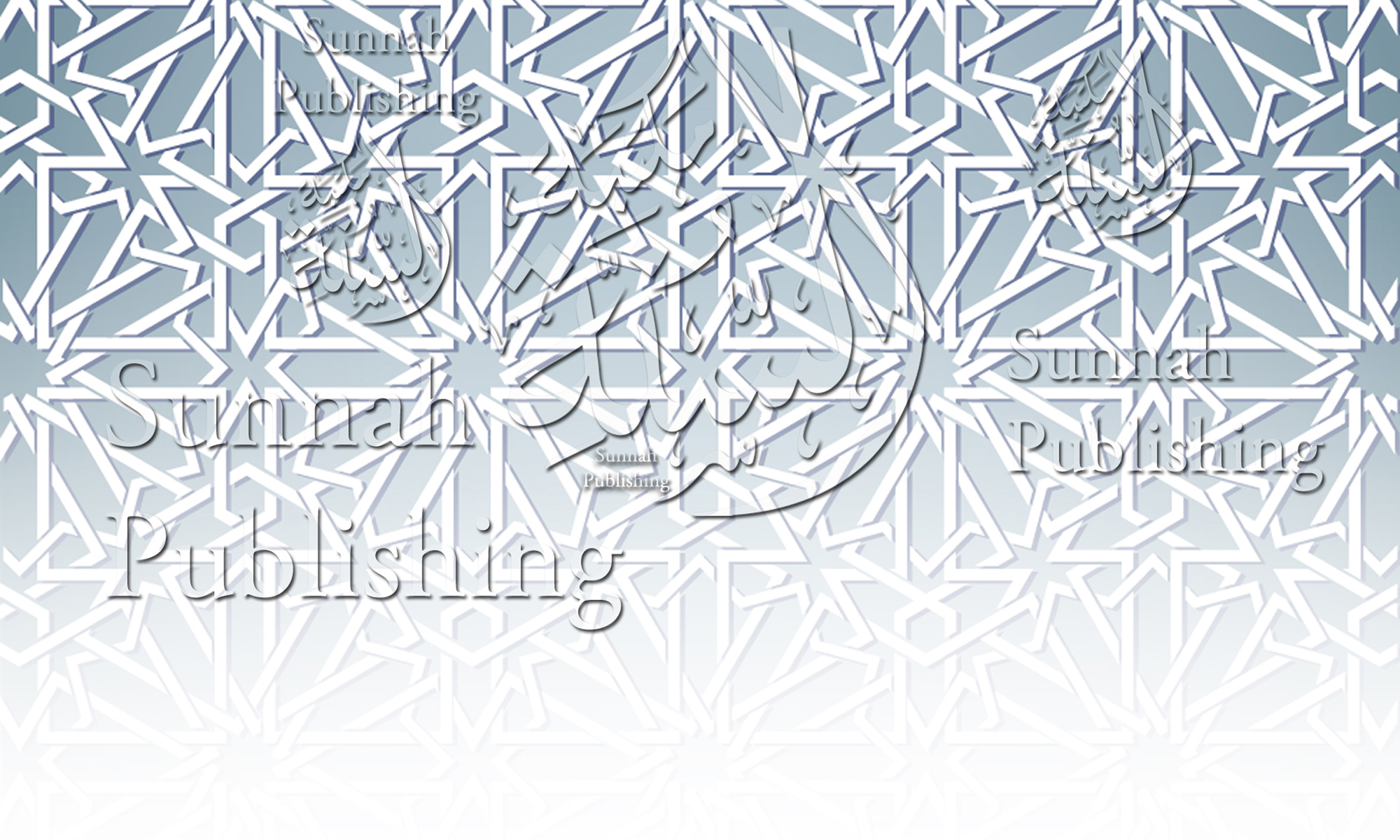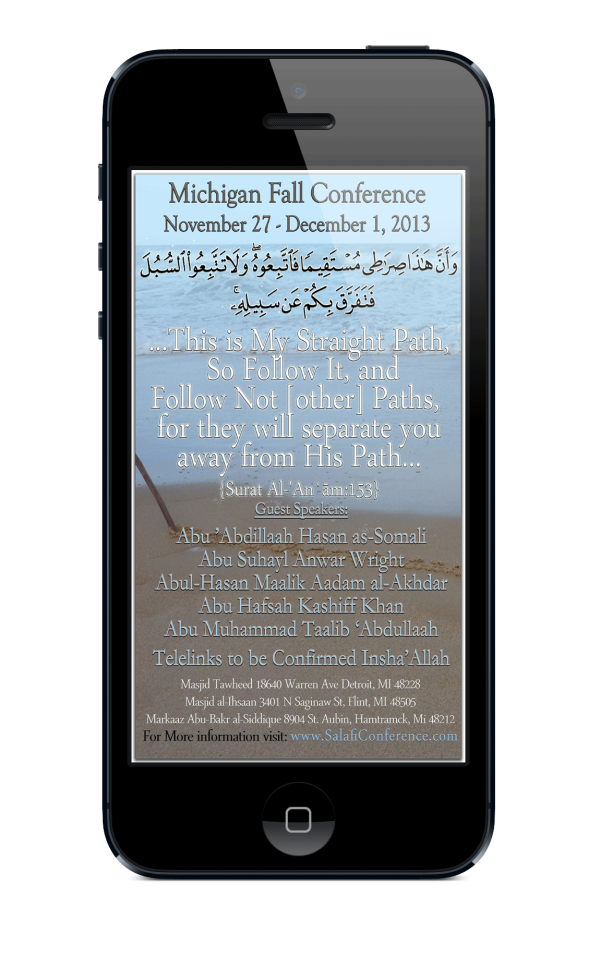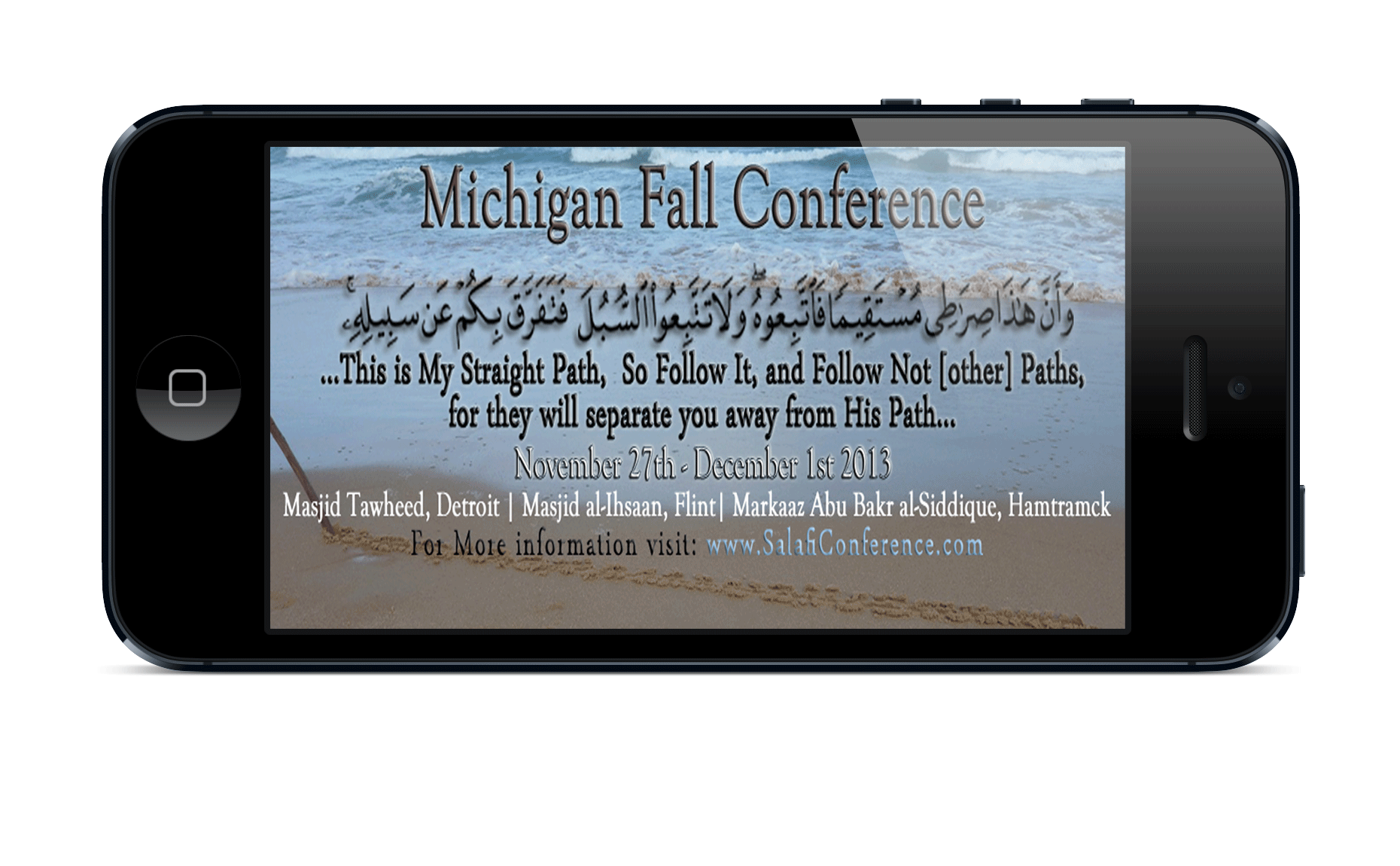NEW AUDIO: Human Engineering – Abu Muhammad Taalib Abdullah
NEW AUDIO: Benefits from the Sharee’ah of al-Ajurry – Abu Abdillah Hasan as-Somali
NEW AUDIO: Hold On To The Sunnah With Your Molar Teeth – Abul-Hasan Maalik ibn Aadam
NEW AUDIO: This is My Straight Path, So Follow it Conference – 22 CD Set
22 CD Set on Sale for $59.99
Michigan Fall Conference: This is My Straight Path, So Follow it – 22 CD Set
Hold On To The Sunnah With Your Molar Teeth – Abul-Hasan Maalik ibn Aadam – 3 CDs
Human Engineering – Abu Muhammad Taalib Abdullah – 1 CD
Order Good and Forbidding Evil – Jum’ah Khutbah – Abu Hafsah Kashiff Khan – 1 CD
Siyaanat-us-Salafi (Protecting the Salafi) from the Whispers and Deceptions of Ali al-Halabi – Abu Suhayl Anwar Wright – 1 CD
Teaching Our Kids the Importance of Islamic Education – Abu Muhammad Taalib Abdullaah – 1 CD
The Role of the Muslim Woman in Society – Abu Muhammad Taalib Abdullaah – 2 CDs
This is My Straight Path So Follow It – Abu Hafsah Kashiff Khan – 6 CDs
Who are the Successful – Jum’ah Khutbah – Abu Abdillah Hasan as-Somali – 1 CD
Many People are Exposed during the Times of Fitnah – Abu Abdillah Hasan as-Somali – 1 CD
Benefits from the Sharee’ah of al-Ajurry – Abu Abdillah Hasan as-Somali – 1 CD
The Special Characteristics of the Salafi Woman – Abu Abdillah Hasan as-Somali – 1 CD
The Path to Proper Tarbeeyah (Islamic Education and Cultivation) – Abu Muhammad Taalib Abdullaah – 2 CDs
The Struggle to Stay Upon the Straight Path – Jum’ah Khutbah – Abu Muhammad Taalib Abdullaah – 1 CD
Advice of Imaam Muqbil Ibn Haadee al-Waadi’ee (d.1421H) to Pray the ’Eed Prayers with Ahlus-Sunnah
[Q]: We are youth of Ahlus-Sunnah from the city of Baytul-Faqeeh. We do not have a musallaa (place of Prayer) for ourselves in which we may pray the ’Eed Prayer. However, there is a common musallaa within the city and the khateeb (speaker) is a Soofee and there are others there who are Surooriyyeen. Due to that, we travel to a neighbouring town that is five kilometers away from us. Due to this, we find criticisms from some of our brothers who say, ‘This is considered splitting up the unity of the Muslims. So what is your instruction concerning that? May Allaah preserve you.
 [A]: That which we advise with is at-Tamayyuz (being distinct and clearly distinguished). So how can you pray behind a Soofee who propagates his Soofiyyah?!! And the Messenger (sallallaahu ’alayhi wa sallam) said, “Whosoever from amongst you sees an evil, then let him change it with his hand. So if he is unable to do that, then let him speak out against it with his tongue. So if he is unable to do that, then let him hate it within his heart. And that is the weakest of eemaan (faith).” [1]
[A]: That which we advise with is at-Tamayyuz (being distinct and clearly distinguished). So how can you pray behind a Soofee who propagates his Soofiyyah?!! And the Messenger (sallallaahu ’alayhi wa sallam) said, “Whosoever from amongst you sees an evil, then let him change it with his hand. So if he is unable to do that, then let him speak out against it with his tongue. So if he is unable to do that, then let him hate it within his heart. And that is the weakest of eemaan (faith).” [1]
And safety from fitan (trials, tribulations) comes through keeping a distance from the innovators and remaining near beneficial knowledge and calling to Allaah. This is what is required. May Allaah bless you.
As for those who discourage you from this, then they are either infiltrators amongst Ahlus-Sunnah from the Ikhwaanul-Muslimoon, or they are from Ahlus-Sunnah, but they are not familiar with the plots of the hizbiyyeen (biased partisans).
So we advise all of Ahlus-Sunnah to make themselves clearly distinguished and distinct (tamayyuz) with regards to the ’Eed Prayers, the Jumu’ah Prayers and the rest of the Prayers that take place within the mosque and outside of it. At-Tamayyuz is absolutely necessary. After that, the people will come if Allaah so wills, as long as you select a khateeb (speaker) who has benefited in knowledge to the extent that he can benefit the people and he has wisdom. The people will come, with the permission of Allaah, and pray with you and abandon that Soofee.
So I raise a complaint to Allaah with regards to these brothers of ours from Ahlus-Sunnah. He may be a Sunnee, one who loves goodness, but he says the likes of this!! Leave alone those who say this. Allaah says,
“Had they gone forth with you, they would not have increased you except in confusion, and they would have been active amongst you.” [Sooratut-Tawbah 9:47]
So we keep a distance from the innovators and from those who have diseased hearts. And we establish the Sunnah of the Messenger of Allaah (sallallaahu ’alayhi wa sallam). And Allaah the Glorified and Exalted says in His Noble Book,
“And keep yourself patient by being with those who call upon their Lord in the morning and the evening, seeking His countenance. And let not your eyes pass beyond them, desiring adornments of the worldly life, and do not obey one whose heart We have made heedless of Our remembrance and who follows his desire and whose affair is ever in neglect.” [Sooratul-Kahf 18:28]
So we are not concerned in the least with the speech of the innovators. They will not be pleased up until you become innovators like them. So from the beginning of the affair, we have isolated ourselves from the innovators and we continue to isolate ourselves from the innovation. And Allaah is One from Whom aid is sought. [2]
Endnotes:
[1]: Related by Muslim (no. 49), Aboo Daawood (no. 1140), Ibn Maajah (no. 4013) and an-Nisaa‘ee (8/111).
[2]: Refer to the audio cassette: As‘ilah min Baytil-Faqeeh of Muqbil Ibn Haadee.
Translation by Maaz Qureshi
DETROIT CONFERENCE: This is My Straight Path, So Follow it, and Follow Not (other) Paths, for they will separate you away from His Path
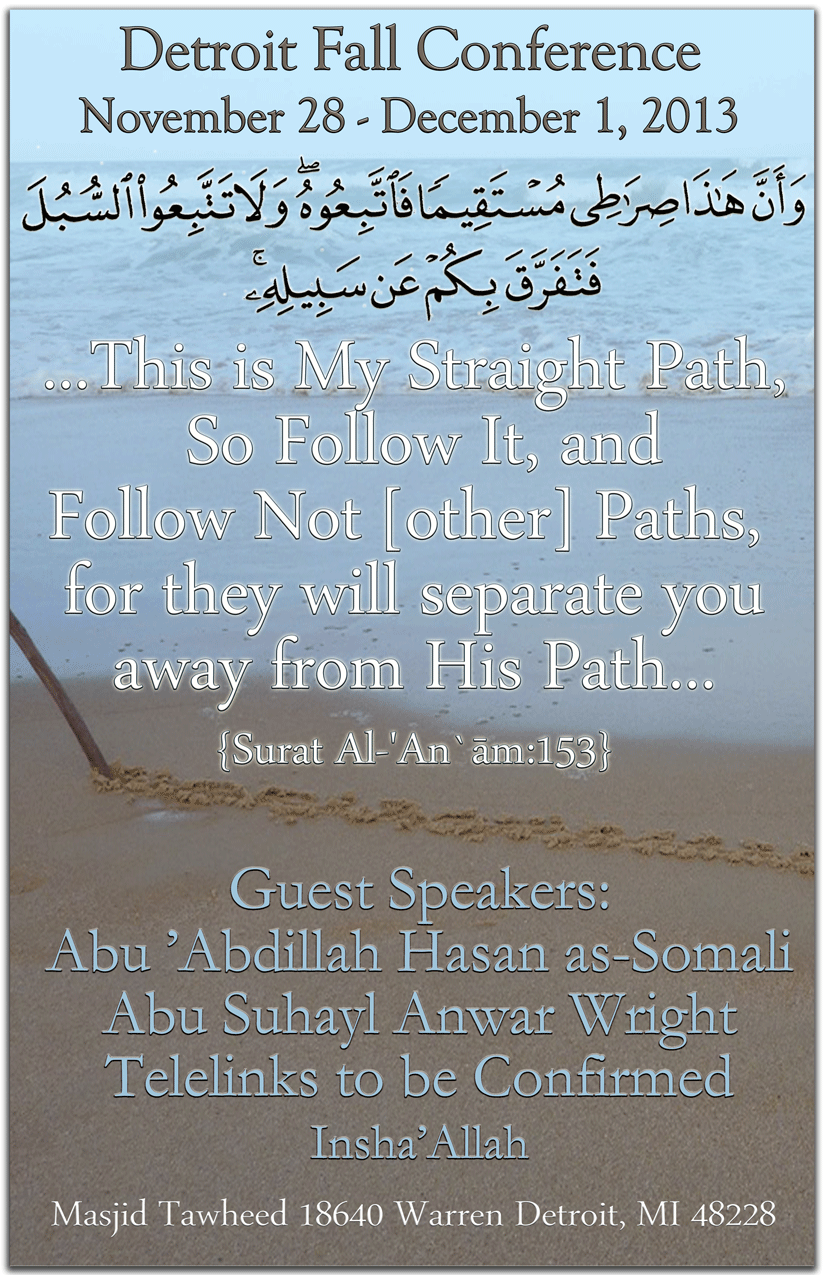
Save the Date for the next Detroit Conference: This is My Straight Path, So Follow it, and Follow Not (other) Paths, for they will separate you away from His Path with our noble brothers, Hasan as-Somali, Anwar Wright, and Telelinks with Ulama. The event will be broadcast live on Sunnahpublishing.net/live, inshaa’ Allaah.
Is it from the Sunnah to appoint an Ameer in Da’wah?
Shaykh Muqbil Ibn Haadee al-Waadi’ee
– rahimahullaah –
For additional benefit, refer to the previous article: Appointing a Person as an Amir and Returning to Him When Differing Occurs – al-’Allaamah Rabee’ Ibn Haadee al-Madkhalee.
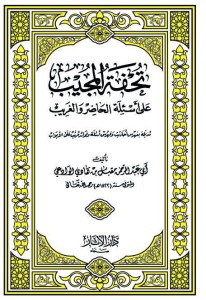 [Q]: If a group of the youth agreed to work together for da’wah in a particular place, is it upon them to have one responsible over them who must be obeyed?
[Q]: If a group of the youth agreed to work together for da’wah in a particular place, is it upon them to have one responsible over them who must be obeyed?
[A]: There is no problem that they place one responsible (over them) but he is not called Ameer; this is because the Ameer is only appointed during a journey, except if it is the Ameerul-Mu‘mineen who is the leader of the Muslims (i.e. ruler of the Muslim land) or the one who the Muslim ruler places in charge. So as for them calling this one Amir, then no! Also, if he is placed as responsible over a particular task, then he should remain within the limits of that, and if he opposes the Book of Allah or the Sunnah, then Allaah the Mighty and Exalted says in His Noble Book,
“And in whatsoever you differ the decision thereof is with Allaah.” [Sooratush-Shooraa 42:10]
And He says,
“And if you differ in anything then return it to Allaah and His Messenger if you truly believe in Allaah and the last day.” [Sooratun-Nisaa‘ 4:59]
However, if a person who is trustworthy is available and the funds for the da’wah were placed for him to look after, or if there is a person who teaches, possessing insight (i.e. in Allaah’s Religion) and he became in charge of teaching and likewise a person who has experience and insight in calling to Allaah, then this is no problem. And again he is not to be called an Ameer, however he is responsible within the limits of his responsibility. But if he comes with something opposing the Book and the Sunnah one does not listen to him or obey him.
As for what the hizbiyyoon do, those who are people of hidden secrecy, every five (years) they have an Ameer and they do not acknowledge except themselves, nor do they acknowledge anyone else from those upon that da’wah. It continues like this until it ends at the unknown Ameer. Just like the Saahib as Saraadib who the Raafidah claim (to exist), whom Ahlus-Sunnah have said regarding him: (Shaykh quotes the following poetry),
“Has not the time come for the Phantom to give birth to
The one whom, because of your ignorance,
you have charged him over your affairs,
but has yet to come.
(But it is only that) your intellects are ruined
Because you’ve created a third (fabricated superstition) after the Griffin and Ghoul.[1]
So beware, beware of blind following; because individuals first start by having good thoughts about a person, then afterwards, there is no word except that of the Shaykh! No, rather the word is what Allaah said and what the Messenger of Allaah (sallallaahu ’alayhi wa sallam) said.
Allaah says,
“Follow what has been sent down unto you from your Lord and follow not any awliyaa‘ (close friends and protectors) besides Him. Little do you remember!” [Sooratul-l A’raaf 7:3]
Because indeed it has led some people to blind follow and they defend innovations just as done by some Ikhwaanul-Muslimeen. They defend the innovator Hasan al-Bannaa who used to make tawaaf (circumambulation) around the graves, and used to stand for the Messenger of Allaah (sallallaahu ’alayhi wa sallam) celebrating the Mawlid (the birthday of the Prophet), and the one who called to unity between the Shee’ah and Ahlus-Sunnah, and this is all present in the books of the Ikhwaanul-Mufliseen (the bankrupt brotherhood!).
If you say to them, such and such matter is not permitted by the Islamic legislation, one of them will reply to you: But the Shaykh said, or the Ustaadh said. Rather, one of them said (in poetry),
“Indeed the Ikhwaan have a tower
Everything in it is hasan (lovely)
Do not ask who built it
Indeed it is al-Bannaa Hasan (i.e. literally the builder, Hasan; intending the founder of the Ikhawaanul-Muslimeen: Hasan al-Bannaa).”
So with them, democracy is something good, likewise elections are something good, and hizbiyyah and unity between the Sunnah and Shee’ah, and having a Christian secretary. And the Lord, the Mighty and Majestic says in His Book,
“O you who believe, take not as your Bitaanah (advisors, consultants, protectors, helpers, friends) those outside your religion since they will not fail to do their best to corrupt you. They desire to harm you severely. Hatred has already appeared from their mouths, but what their breasts conceal is far worse.” [Soorah Aali-’Imraan 3:118] [2]
Endnotes:
[1]: (TN): The Raafidah claim to be waiting for Saahib as Saraadib (the companion of the basement) who they claim name is Muhammad Ibn Hasan, the 12th Imaam, and they claim he is the Mahdee who is waiting to appear in the last days. He supposedly is alive now and issues fataawaa for the Shee’ah and his so called ambassadors relay these fataawaa to the people after taking money from them that they claim to deliver to him!!!
[2]: Taken from Tuhfatul-Mujeeb (p. 168-169) of Shaykh Muqbil al-Waadi’ee.
Translation by Anwar Wright
The Ruling on Combining the ’Ishaa‘ Prayer with the Maghrib Prayer at the Time of Maghrib
al-’Allaamah ’Ubayd Ibn ’Abdullaah al-Jaabiree
[Q]: Is it permissible for them (in Britain) to combine the ’Ishaa‘ Prayer with the Maghrib Prayer at the time of Maghrib? This is because the time of Fajr there is 3:00AM and the time for breaking fast is 9:30PM at night, and ’Ishaa‘ is at 11:00PM at night?
[A]: There is no problem with that, if Allaah wills, and I have already answered the like of this matter in many sittings, by way of this website (i.e. Miraathul-Anbiyaa‘) and other than it. It has been authentically reported upon the Prophet (sallaallaahu ’alayhi wa sallam) that while in al-Madeenah he combined between the Dhuhr Prayer and ’Asr Prayer and between the Maghrib Prayer and ’Ishaa‘ Prayer at the time of the first of the two Prayers. He prayed Dhuhr and ’Asr as eight raka’aat (i.e. he did not shorten the Prayers but rather just combined as he was residing locally in al-Madeenah) and he prayed Maghrib and ’Ishaa‘ as seven raka’aat (i.e. three for Maghrib and four for ’Ishaa‘).
When Ibn ’Abbaas (radiyallaahu ’anhu) was asked about why he (i.e. the Messenger of Allah) did this, he said, “This was as to not place a hardship upon his Ummah.” [1] And according to what you described in your question, then this is a hardship, and to remove that hardship is by combining the two Prayers at the time of the first of the two. You can pray Maghrib then pray ’Ishaa‘ (right after). Also there is no problem that you pray what is easy for you from the Taraaweeh Prayer. This is because the time for the ’Ishaa‘ Prayer became earlier, as its time became along with the time for Maghrib Prayer. Meaning, the time for Maghrib Prayer also became the time for ’Ishaa‘ Prayer (i.e. because of the intention of combining the two). Or you can pray the Taraaweeh Prayer in your homes. You must not quarrel over this.
Endnotes:
[1]: Related by Muslim (no. 705).
Translation by Abu Suhayl Anwar Wright
Shaykh Rabee’ Ibn Haadee al-Madkhalee on Affiliating with as-Salafiyyah

[Q]: Noble Shaykh, is it sufficient for the one who follows the Sunnah to just call his self a Muslim or must he add to that another name, meaning Salafee?
[A]: Why are not the likes of these questions asked all the time regarding being Ash’aree for example or Maatureedee or Teejaanee or Marghanee or Naqshabandee or Sahrawardee; you find hundreds of paths (of deviation and misguidance) and there is never a problem with that. The reason is, it is as if these are correct with these people and there is no objection to them. The apparent from the one on all these misguided paths is that he is a Muslim (as well) and there is never an objection (to these names). It is as if they see it to be correct and there is never any objection, except with the word: Ahlul-Hadeeth, except with Salafiyyeen.
Ok, what do the words Teejaanee, Naqshabandee or Sahrawardee entail? They entail Hulool and Wahdatul-Wujood (belief that Allaah enters His creation and that Allah becomes one with His creation) and they entail Shirk, kufr (disbelief) and various types of misguidance. As for the word Salafee, what does it entail?
Put the words to the side (for a minute), what is important now is the meanings. What does the word Salafiyyah and Ahlul-Hadeeth entail; do they carry and falsehood?
I ask you all now and you are in front of me, the People of Hadeeth, do you find that they carry any falsehood or call to falsehood? So long as this reality is correct (i.e. that Salafiyyah and Ahlul-Hadeeth do not entail falsehood) then the word is correct and there is no disputing in regards to the words.
However, these (who dispute that) are the people of fitnah (trial, tribulation) and the people who stir up trouble and they only seek to cause trouble upon the truth that this word carries. So know the plots and attacks of the people of fitnah and innovation and continue upon using the word Ahlul-Hadeeth and Salafiyyeen because they are the truth.
Ibn Taymiyyah (d.728H) said that it is incumbent to affiliate with Salafiyyah. If you affiliate with Salafiyyah you do not affiliate with a specific person or the methodology of a specific person and you are not affiliating with innovations, rather (by this) you only affiliate with the Companions and the virtuous generations who were upon guidance by the testimony of the Messenger of Allaah (sallallaahu ’alayhi wa sallam),
“The best of the people is my generation then those who follow them and then those who follow them. Then there will come after them a people who will give testimony when not asked to do so, and they will vow but not fulfill it and obesity will become abundant in them.” [1]
So therefore you affiliate with these generations in which the Messenger (sallallaahu ’alayhi wa sallam) testified to their goodness. Rather, Allaah testified to their goodness,
“You are the best nation to be raised up from Mankind, you command the good and forbid the evil.” [Soorah Aali-’Imraan 3:110] [2]
Endnotes:
[1]: Saheeh: Related by Aboo Daawood (no. 4657), at-Tirmidhee (no. 2222) and Ahmad in al-Musnad (no. 19405). It was authenticated by al-Albaanee in Silsilatus-Saheehah (no. 1845).
[2]: Refer to al-Lubaab (p. 102-103) of Rabee’ al-Madkhalee.
Translation by Abu Suhayl Anwar Wright
